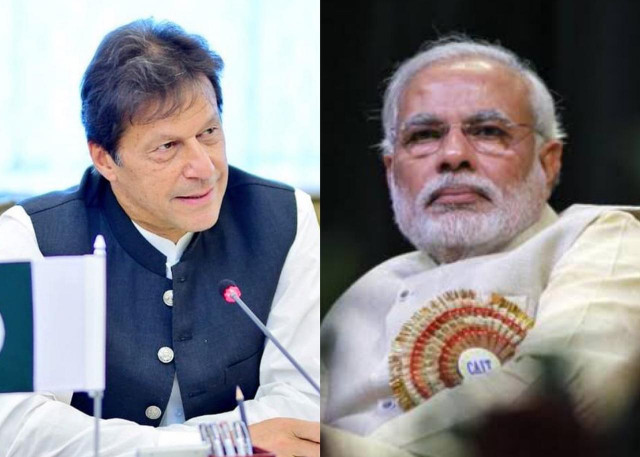Kashmir to Kartarpur
But amidst all this doom and gloom, India & Pakistan last week signed an agreement to open the Kartarpur Corridor

File photos of PM Imran Khan [L] and Indian Premier Narendra Modi [R]. PHOTO: PIT/ Reuters
Despite tensions over the Pulwama attack, Prime Minister Imran Khan congratulated Prime Minister Narendra Modi over his re-election in May. Modi responded to Imran’s gesture by vowing to face common challenges to the two countries. In June, the two leaders even shook hands in Bishkek on the sidelines of the Shanghai Cooperation Organization (SCO) summit. The two sides tried to play down the informal interaction between Imran and Modi but privately acknowledged that the meeting was much more than a courtesy call.
Those little moments of sanity raised the prospects of peace. But all those hopes crashed on August 5 when the Modi government revoked the special status of the disputed Jammu and Kashmir region, triggering a new phase of bitter rivalry between Pakistan and India.
Imran, who was hoping for a rapprochement, launched blistering attack against Modi, equating him with Adolf Hitler. His government, which was earlier willing to go extra mile for peace, downgraded diplomatic ties and suspended bilateral trade with India. The two countries have since been engaged not only in war of words but also their militaries have been frequently involved in skirmishes along the Line of Control (LoC). Only recently, the Indian army targeted the civilian population on the Pakistani side, killing many. The India army chief claimed they had targeted the so-called “terror launch pads”. But Pakistan was quick to debunk the Indian claims by taking heads of diplomatic missions to the troubled LoC. The Indian head of diplomatic mission was also invited for the visit. But he didn’t turn up nor share details or locations of the alleged terror launch pads.
In a nutshell, currently, there is a complete breakdown in the relationship between the two neighbours. Unlike the previous phases of tensions, this time the two countries are not even talking to each other through “back channels”, at least for now.
But amidst all this doom and gloom, the two countries last week signed an agreement to open the Kartarpur Corridor. The images showing Pakistani and Indian officials shaking hands and smiling before the cameras were in total contrast to the overall animosity between the two countries.
The significance of the Kartarpur Corridor can be judged from the fact that it is the first-ever visa-free border crossing between the two countries. This is not a small achievement given the fact that because of the troubled ties, people often from both sides struggle to obtain visas to travel to each other’s country.
Therefore, it is a legitimate question to ask: why the two countries are
going ahead with the Kartarpur project despite worsening ties otherwise? The reason is that both countries have huge stakes in the initiative. From Pakistan’s perspective, it wants to convey a message to the international community that it respects minorities.
More importantly, through opening the Kartarpur Corridor, Pakistan wants to create a goodwill in the Sikh community in India, something that can become a factor in future relationship between Islamabad and New Delhi. India, under Modi, is certainly not keen to have any engagement with Pakistan. But in this case, it had to respond positively to Pakistan’s proposal simply because the Modi government cannot afford antagonising Sikhs, whose religious sentiments are connected to the Kartarpur Corridor.
Whatever the reasons, the agreement illustrates that the two countries can find convergences on other issues too if they show the same spirit and intent as we have seen in the case of Kartarpur initiative
















COMMENTS
Comments are moderated and generally will be posted if they are on-topic and not abusive.
For more information, please see our Comments FAQ